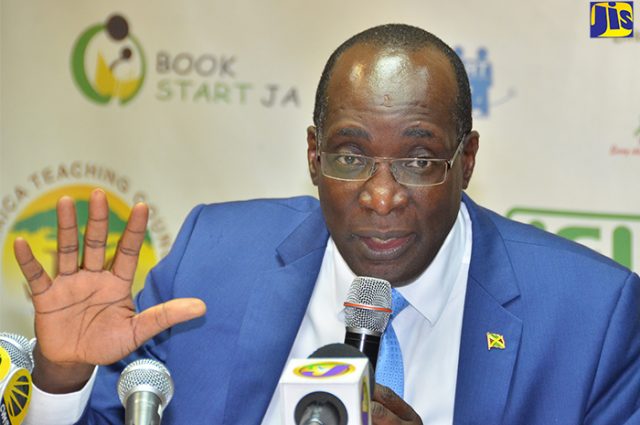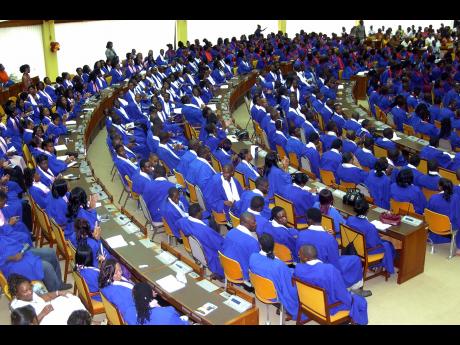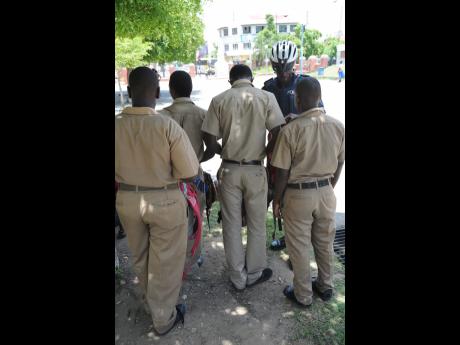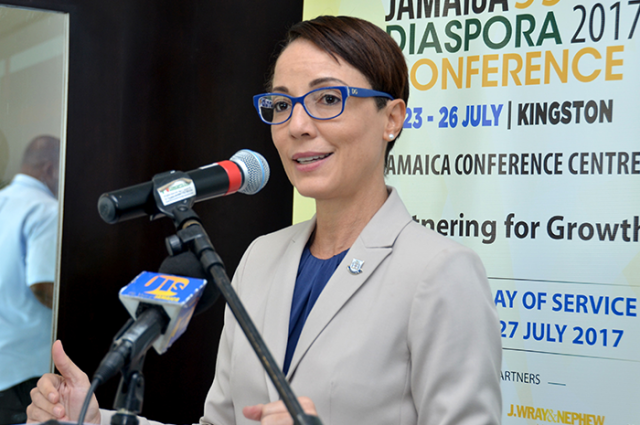GLEANER:The Ministry of Education is reporting that regardless of qualification, students leaving the secondary school system will be able to enroll in a programme that will enable them to improve their prospects for employment or further studies. Such programmes are tailored for those students who did not matriculate to sixth form or who chose not to attend sixth form.
Chief Education Officer at the Ministry of Education Dr Grace McLean says placement is possible through the Housing, Opportunity, Production and Employment Programme (HOPE) and Learn, Earn, Give back through service and Save programme (LEGS), among others.
The HEART Trust/NTA is taking a lead role in the implementation of the various programmes, alongside such agencies as the National Youth Service (NYS) and the Career Advancement Programme (CAP). The available programmes include the HOPE Youth Summer Programme, the National Service Corps Programme, the School Leavers Training Opportunities Programme, also called SL-TOP, and the CAP for grades 12 and 13 students.
The recently introduced government initiative, HOPE, seeks to introduce a range of social-intervention programmes affecting the local community and the most vulnerable groups in the society, inclusive of the youth population. Both the HEART Trust/NTA and the NYS are taking lead roles in the implementation of the employment component of HOPE. To this end, HEART Trust says it’s aiming to add value while empowering the youth by enhancing their prospects for job placement through employable and technical skills acquisition. Participants are, in large part, impacted through a strategy under HOPE which addresses their productive engagement to LEGS.
… The HOPE Youth Summer Work Programme
The HEART Trust says some dimensions of the LEGS strategy are already being implemented to increase the percentage of the individuals trained, certified and placed in jobs or entrepreneurial activities.
These include the NYS-led HOPE Youth Summer Work Programme, which runs from June to August.
– The HOPE Youth Summer Programme runs for three months.
– It targets just over 25,000 young people, inclusive of those leaving school.
– Participants are being provided with an opportunity to gain three weeks of work experience while earning a stipend.
– Stipend can be used, among other things, to contribute to future educational pursuits.
– Participants are exposed to key employable skills, such as rÈsumÈ preparation and interviewing techniques.
– Based on assessment, following orientation, selected participants will be further engaged in a two-week job-readiness training programme as part of preparation to access jobs in the business process outsourcing sector.
… HEART-Trust/NTA
For the thousands of unattached teenagers graduating from the formal education system this summer, and who may be short on qualification, the HEART Trust/NTA may be your best option.
According to the HEART Trust, its approach is to assess each individual and determine which programme they are best suited to participate in. It says everyone will be aligned to an appropriate programme.
Those without CXCs must do the following:
– Sit the HEART diagnostic assessment.
– Academic strengthening intervention is provided for those who need basic numeracy and literacy-skills enhancement.
– Following assessment, selectees could be placed in the National Service Corps Programme.
– Participants with a single CSEC subject or who demonstrate mastery in the HEART diagnostic assessment can matriculate to National Vocational Qualification of Jamaica (NVQJ) programmes at HEART institutions or enroll in the National Apprenticeship Programme.
– Participants with two or more CXC passes can matriculate straight into the SL-TOP or NVQJ programmes offered at HEART institutions.
– Participants with five or more CSEC subjects can matriculate to the Vocational Training Development Institute.
… The School Leavers Training Opportunities Programme
A variant of the apprenticeship programme, the School Leavers Training Opportunities Programme (SL-TOP) is aimed at training school leavers between the ages of 17 and 23.
– SL-TOP uses on-the-job modality in specific disciplines.
– Programme duration is one to two years for persons with two or more CSEC subjects or equivalent qualifications.
– SL-TOP offers a high rate of job placement as many of the trainees are offered employment in the firm where they received training.
… National Service Corps Programme
School leavers can also tap into the National Service Corps Programme, which targets young people 18 to 24-years-old. THE NYS is the main implementing agency. The programme offers the following:
– Apprentices are exposed to both core and technical skills.
– Core skills include self-development, conflict management, family life management, civics, social etiquette, etc.
– Technical skills include document management and digitisation, environmental management, geographic information system, infrastructure and construction and hospitality.
… Access to Higher Education Partnership Programme
The NYS also assists school leavers through its Access to Higher Education Partnership Programme. This is a scholarship provided for youth who have matriculated to a tertiary educational institution to pursue study in areas of national importance.
– Scholarship recipients receive $100,000 per annum towards their tuition.
– Partnering institutions pay a percentage of the tuition fee for the beneficiary.
– The NYS currently partners with the College of Agriculture, Science and Education; the Caribbean Maritime Institute; Brown’s Town Community College; Montego Bay Community College, and the Northern Caribbean University.
– Tuition assistance is provided to scholars who are studying in national priority areas of agriculture, logistics, engineering, tourism, information and communication technology.
– Scholars are required to maintain a GPA of 3.0 and are engaged in empowerment sessions and volunteer service.
…Volunteerism
Another option for school leavers this summer is volunteerism. Those thinking about volunteering should contact the National Youth Service (NYS).
– The NYS offers a structured volunteer experience.
– The programme is designed to increase youth participation in national and community initiatives.
– Programme aim is to foster civic responsibility and strengthen communities.
– Youth can be facilitated within an organisational setting, in community-based projects, special days or activities on a continuous basis.
CAPTION: Hundreds of graduates listen attentively at a HEART Trust/NTA Annual Regional Certification Ceremony at the Jamaica Conference Centre in downtown Kingston.









